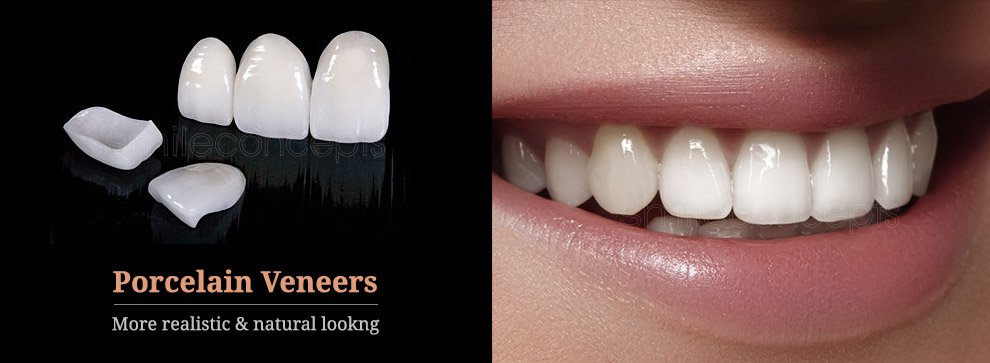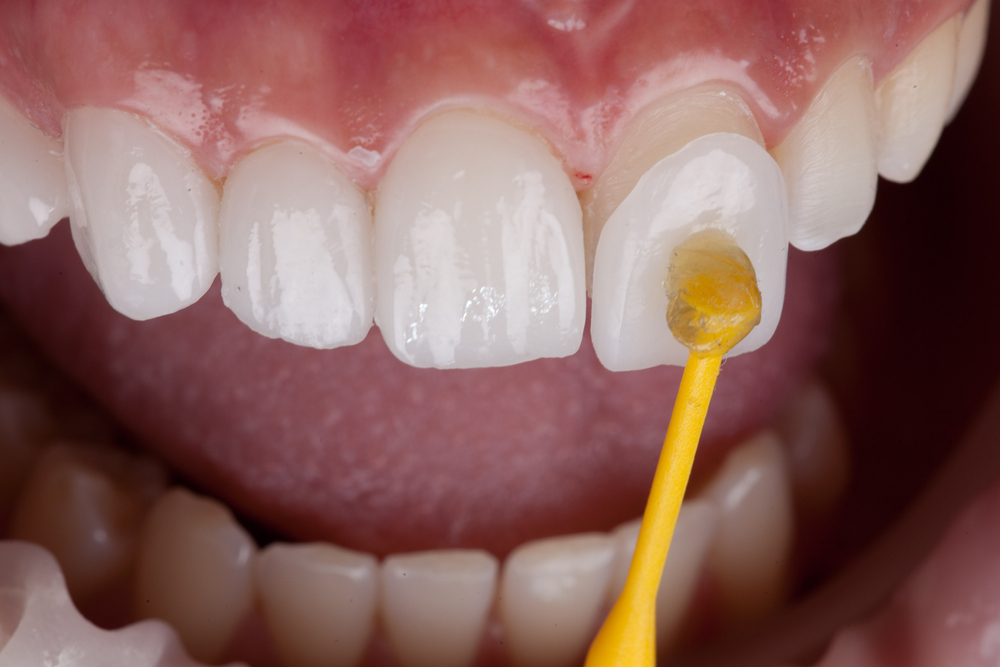Dental Veneers: Types, Applications, and Choosing the Right One
Unlocking the Tricks of Veneers: Truths, Kinds, and Advantages for a Lovely Smile
Veneers provide a compelling option for those seeking to enhance their smiles. These dental enhancements can attend to numerous flaws, from staining to misalignment. With options like porcelain and composite, people can choose based on their needs and choices. However, understanding the subtleties of veneers, including application and treatment, is essential. What elements should one think about before making a choice? The answers may shock those thinking about this visual dental option.

Comprehending Veneers: What Are They?
Veneers are thin, customized coverings created to cover the front surface area of teeth, boosting their appearance. Typically crafted from durable products, these shells are customized to fit each person's teeth specifically. They offer several purposes, consisting of dealing with aesthetic flaws such as staining, chips, or voids. The application process entails a dental professional preparing the teeth, commonly by getting rid of a little quantity of enamel to guarantee a tight fit. Once prepared, the veneers are bonded to the teeth utilizing a strong adhesive.
Individuals usually choose veneers for their ability to develop a natural-looking smile while supplying a durable option to oral flaws. Unlike other aesthetic dental care options, veneers call for marginal invasive procedures, making them a popular option. The outcome is a better smile that can significantly boost a person's self-confidence and self-worth. Overall, veneers supply an effective technique to accomplishing a much more attractive and harmonious dental appearance.
Sorts of Veneers: Porcelain vs. Composite
When thinking about aesthetic oral options, 2 main kinds of veneers stand out: porcelain and compound. Porcelain veneers are crafted from a durable ceramic product that simulates the natural appearance of teeth. They are known for their discolor resistance and capability to reflect light similarly to all-natural enamel, giving a visual allure that numerous individuals desire. The application procedure typically involves more preparation of the tooth framework and might require several check outs to the dental expert.
On the various other hand, composite veneers are made from a tooth-colored material that is directly put on the teeth. This type allows for quicker application and can often be completed in a single go to. While they are less costly than porcelain veneers, they may not provide the same durability or resistance to discoloration. Eventually, the selection between porcelain and composite veneers relies on individual preferences, budget plan, and certain oral requirements.
The Benefits of Choosing Veneers
Picking veneers supplies many benefits that can significantly improve both the appearances and capability of a person's smile. Among the primary benefits is their capability to deal with imperfections such as discoloration, spaces, and misalignment, leading to an extra consistent appearance. Veneers can likewise enhance the durability of teeth, offering a protective layer that shields them from damage.
Additionally, they need very little tooth preparation contrasted to other dental treatments, preserving more of the natural tooth framework. This preservation adds to a healthier oral setting while still achieving a stunning smile.
Veneers are very customizable, permitting individuals to select the shape, size, and shade that finest matches their choices. Furthermore, they are stain-resistant, making it simpler to keep a intense and appealing smile gradually. Generally, veneers provide an efficient alternative for those looking for both cosmetic enhancement and long-term oral wellness advantages.
The Veneer Application Refine
The veneer application procedure involves a number of essential steps to ensure excellent outcomes. An examination is conducted to assess the individual's requirements, adhered to by the preparation and shaping of the teeth. The veneers are bonded in place, with modifications made for a best fit and appearance.
First Examination Tips
A thorough preliminary examination is important for anybody taking into consideration veneers, as it sets the foundation for an effective therapy. Throughout this meeting, the oral specialist evaluates the person's oral health and wellness, reviewing any type of existing concerns that can impact the veneer application. This analysis might consist of X-rays and a visual exam to figure out the problem of the teeth and gums.
The dentist additionally involves the patient in a detailed discussion about their visual objectives, choices, and assumptions. They might present numerous veneer options customized to the client's details demands. In addition, the expert explains the procedure, potential risks, and aftercare needs, making certain that the patient is well-informed and comfortable prior to waging the therapy.
Prep Work and Forming Teeth
After the first assessment, the next phase entails the prep work and shaping of the teeth to fit the veneers. This crucial step is carried out by the dentist, who meticulously assesses the tooth framework to figure out the quantity of enamel that requires to be eliminated. Commonly, a thin layer, normally around 0.5 millimeters, is cut off to assure an appropriate fit for the veneers. Precision is extremely important during this procedure, as it affects both the visual outcome and the total comfort. Once the teeth are sufficiently shaped, perceptions are required to create personalized veneers that line up flawlessly with the individual's dental account. This careful preparation establishes the stage for a successful veneer application, boosting both appearance and feature.
Bonding and Final Modifications
Complying with the shaping and prep work of the teeth, the bonding process starts, noting an essential phase in the veneer application. During this stage, a dental adhesive is related to the prepared tooth surface, assuring a strong bond between the tooth and the veneer. The dentist meticulously places the veneer, making changes to accomplish the preferred positioning and looks. As soon as properly put, an unique light is used to treat the adhesive, strengthening the bond. After curing, the dentist conducts last modifications, cutting any type of excess product and fine-tuning the veneer's shape to guarantee a natural look. This careful interest to detail improves both feature and appearances, adding to an overall beautiful smile that is resilient and durable.
Caring for Your Veneers: Upkeep Tips
Taking care of veneers is necessary to keep their look and durability. A consistent daily cleaning regimen, conscious evasion of discoloring foods, and routine oral exams are crucial elements of efficient upkeep. These techniques aid guarantee that veneers continue to be in peak problem and remain to boost one's smile.
Daily Cleaning Regimen
On a regular basis maintaining veneers is necessary for their durability and appearance. An appropriate daily cleaning regimen can aid maintain their luster and protect against damage. Dental practitioners suggest cleaning twice a day with a soft-bristled toothbrush and fluoride tooth paste, making certain that all surfaces are cleansed carefully to avoid damaging the veneer surface. Flossing daily is additionally important to remove food particles and plaque from between teeth, where brushes might not get to. In addition, utilizing an antimicrobial mouthwash can assist maintain oral hygiene without hurting the veneers. It is advisable to prevent rough cleansers and tools that can scratch the veneer. By following these basic actions, people can maintain their veneers looking What Are Veneers lovely while advertising overall dental wellness.
Preventing Discoloration Foods
Although veneers are developed to boost the appearance of teeth, their susceptibility to discoloring necessitates careful dietary selections. It is crucial for individuals with veneers to be mindful of certain foods and beverages that can lead to staining. Dark-colored items such as coffee, red wine, and berry juices need to be consumed in small amounts, as they are understood to discolor both natural teeth and veneers. Furthermore, acidic foods like citrus fruits can compromise the bonding agents made use of in veneers, making them extra vulnerable to discoloration. To preserve a brilliant smile, it is a good idea to rinse the mouth with water after consuming staining foods and to practice regular oral hygiene. These thoughtful options contribute substantially to the long life and looks of veneers.

Normal Oral Check-ups

Maintaining the honesty of veneers calls for a dedication to normal oral examinations, as these visits play a crucial duty in ensuring their longevity and appearance. Throughout these gos to, dental professionals can examine the condition of the veneers, examining for any indicators of wear, damage, or underlying oral concerns. Additionally, routine cleansings aid eliminate plaque and tartar that can accumulate around the veneers, promoting general oral wellness. Dental experts can additionally offer individualized recommendations on care methods and items suited for veneer maintenance. By sticking to a routine of check-ups, people can address possible issues early, ensuring their smile stays vivid and stunning. Ultimately, normal oral brows through are a crucial component of veneer treatment.
Is Veneers the Right Option for You?
Determining whether veneers are the right alternative often depends upon individual dental demands and aesthetic goals. For those looking for to resolve issues such as discoloration, chips, or misalignment, veneers can supply a transformative option. Candidates commonly consist of individuals with healthy and balanced teeth but prefer an improved smile.
Nonetheless, it is essential to take into consideration aspects such as tooth enamel condition, the extent of oral problems, and the desire to keep veneers - Porcelain Veneers Dentist. Consulting with an oral specialist is essential, as they can assess dental health and determine if veneers are ideal
Additionally, prospective prospects must reflect on the lasting commitment, as veneers may require replacement every 10-15 years. Price considerations likewise play a significant function, as veneers can be a significant financial investment. Ultimately, the choice must be knowledgeable, balancing visual needs with sensible considerations for long-term results.
Often Asked Inquiries
How Much Time Do Veneers Normally Last Prior To Requiring Replacement?
Veneers usually last in between 10 to 15 years prior to requiring replacement. Factors such as dental health, lifestyle choices, and material quality can influence their durability, making normal oral check-ups essential for preserving their problem.
Are Veneers Safe for Individuals With Sensitive Teeth?
Veneers can be secure for individuals with sensitive teeth, yet it often depends upon the seriousness of sensitivity and the dentist's method. Consulting an oral specialist before continuing is vital to ensure ideal end results.
Can Veneers Be Gotten Rid Of or Changed Easily?

Do Veneers Stain In Time, and How Can I Avoid It?
Veneers can tarnish in time, specifically from foods and beverages like coffee or red white wine. To stop staining, maintaining excellent oral hygiene, utilizing a straw for beverages, and regular dental cleansings are recommended methods.
What Is the Cost Array for Getting Veneers?
The expense of veneers commonly varies from $500 to $2,500 per tooth, relying on factors such as material type, dental expert experience, and place. Patients should speak with dental professionals for individualized quotes and funding options.
Once the teeth are appropriately formed, impressions are taken to develop custom-made veneers that align flawlessly with the individual's dental account. During this phase, a dental adhesive is used to the prepared tooth surface area, ensuring a strong bond in between the veneer and the tooth. It is vital to take right into account elements such as tooth enamel problem, the extent of oral issues, and the willingness to keep veneers. Veneers can be risk-free for people with sensitive teeth, yet it typically depends on the severity of level of sensitivity and the dentist's strategy. The cost of veneers normally ranges from $500 to $2,500 per tooth, depending on aspects such as product type, dental practitioner experience, and location.